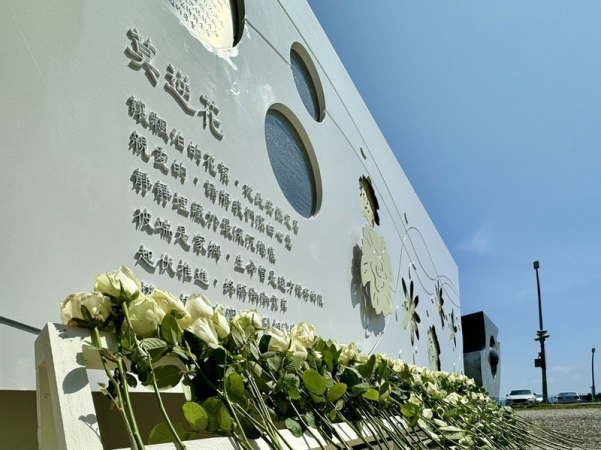
Five years ago today, on October 1, 2019, the Nanfang'ao Cross-Harbor Bridge in Yilan collapsed, tragically claiming the lives of six foreign fishermen. To commemorate this anniversary, civil groups held a press conference, urging the government to address nine key oversight objectives in order to raise awareness about the plight of migrant workers and prevent future tragedies.
Shih Yi-Hsiang, a researcher at the Taiwan Association for Human Rights, read the names of the six fishermen during the memorial: "ERSONA, aged 32, WARTONO, aged 29, MOHAMAD DOMIRI, aged 28, from Indonesia; IMPANG GEORGE JAGMIS, aged 47, SERENCIO ANDREE ABREGANA, aged 44, and ESCALICAS ROMULO JR ILUSTRISIMO, from the Philippines." He then invited attendees to observe a minute of silence for the victims.
Earlier in September this year, the U.S. released its updated "List of Goods Produced by Child Labor or Forced Labor," which once again included fish caught by Taiwanese fishing vessels. According to Lee Li-Hua, Secretary-General of the Yilan Migrant Fishermen's Union, five years after the bridge collapse, foreign fishermen employed by Taiwanese employers still face the risks of forced labor and occupational hazards.
Chiu Yu-Fan, an associate professor at the Institute of Law for Science and Technology at National Yang Ming Chiao Tung University, highlighted the odd dual-track system for managing foreign fishermen in Taiwan. She pointed out that whether fishermen work offshore or along coastal waters, they are covered by the Labor Standards Act. However, Chiu noted, "Although the Ministry of Labor has not excluded offshore fishing from the Act, no level of the government is enforcing its application. Even coastal fishermen, who are explicitly covered, do not see full implementation of these labor protections. So, does Taiwan lack legislation or enforcement—or both?"
To raise awareness about the occupational safety and labor rights of foreign fishermen, civil groups put forward nine key goals for government oversight:
- Establish a mechanism for labor-management negotiations and promote the signing of collective agreements.
- Ensure that the government monitors and enforces minimum labor standards in negotiations between fishermen and employers.
- Foreign fishermen should be mandatory beneficiaries of labor and health insurance, and employers must comply with these insurance regulations.
- Require fishermen to wear life vests and implement multilingual labor and occupational safety inspections and accident reporting systems.
- Promote legal education for employers and rights education for workers.
- Provide fishermen with multilingual channels for complaints, reports, and seeking help.
- Take concrete actions under the National Human Rights Action Plan and its sub-plans.
- Ensure that communication between unions and government agencies, as well as legal regulations, is translated into fishermen's native languages, while supporting unions without interfering in their operations.
- During typhoon conditions, ensure that fishermen are brought ashore for safety, as stipulated in the "Principles for Harboring Fishing Vessels and Sheltering Crew during Typhoons."
Shih Yi-Hsiang emphasized that if Taiwan cannot shed its reputation for forced labor, it will also harm legitimate shipowners. He stated that industrial development and labor rights protection are not mutually exclusive, and urged the government to learn from past mistakes and prevent future tragedies.
Online press conference on the fifth anniversary of the migrant worker victim:https://reurl.cc/lyOElj
[RTI / Source: Interviews / Editor: Chen Nian-Yi] 2024-10-01 19:09
[Photo by CNA]
